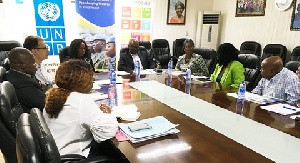The important role of the private sector in the implementation of the Sustainable Development Goals (SDGs) is duly recognized by the Member States of the United Nations (UN).
This is evident in strategic steps each country is putting in place to achieve the goals. However, the ambitious nature of the goals places a huge task on governments to forfeit.
Statistics show that, the total investment needs estimated for the SDGs in developing countries alone is averagely between $3.3 to $4.5 trillion per year with focus on critical infrastructure. Meanwhile, these countries are already facing an annual gap of $2.5 trillion in levels of investment in key SDGs sectors.
As the saying goes “it takes two to tango”, so Governments alone cannot address this funding gap, there is a need for support from the Private sector. The private sector needs to be explored as a critical partner to facilitate the implementation of the SDGs and not being limited just to an important participant in the SDG discourse.
The Challenge: Data Gap
However, to effectively engage and unlock private sector finance especially in the area of climate finance, Governments would need more understanding on the needs and the business actions of the private sector in connection with the SDGs.
The challenge with this has been the absence of data and information about the private sector particularly the indigenous or wholly Ghanaian owned business enterprises.
Most private sector businesses in Ghana do not have proper websites, and where these exist, the data quality or the content of the websites are not useful to assist in developing tailor-made strategic framework for Private Investment in the SDGs as well as the African Union’s Agenda 2063, which seeks to accelerate the socio-economic transformation of the continent.
This challenge is not only prevalent in the private sector but also in the public sector. Obtaining up to date information on key SDGs sectors; government policies and initiatives in Africa is quite a difficult task. The data gap challenge has been widely recognized in major publications from MDGs to SDGs. For example, the 2018 Africa Sustainable Development Report reiterates that data gaps remain a major challenge for adequate reporting of Africa’s progress towards the realization of the SDGs and Agenda 2063.
Private Sector Experience
Nevertheless, experiences with private sector engagement on UNDP programmes in Ghana particularly the Green Climate Fund Readiness Programme, which is supporting Ghana to access international climate finance; China-Ghana South-South Cooperation on Renewable Energy Technology Transfer Project; and the Nationally Determined Contributions Support Programme for the country’s climate actions; all revealed interesting experiences about the structure and operations of private sector businesses in Ghana.
It was discovered that there is a huge potential to increase private sector investment in Ghana, but the setback has been the weak corporate governance structure and less strategic direction of some businesses.
Way Forward: Some Thoughts
Given the critical role of the private sector in the SDGs implementation, governments and international development organizations could double up their facilitation role and provide the needed platform for south-south cooperation on effective business management and operations to address this challenge in Ghana.
Similarly, it appears that most private businesses see the agenda 2030 as an agenda for the governments and the United Nations. Efforts must therefore be made to set a clear business case to attract private sector interest in the implementation of the SDGs.
Moreover, creating innovative Public-Private Partnership business models in the delivery of public goods and services are key to achieving the agenda 2030. Innovative business models should not only be simple, but it must be inclusive and sustainable. Private investors, wealthy families and individuals are most likely to partner the public sector in the delivery of public goods and services when there are coherent and supportive policies.
For instance, about 15% of the Ghanaian population have no access to modern form of energy. To address this energy access gap, there is the need for a supportive policy environment that provides incentives for mini-grids and other decentralized renewable energy solutions. The policy environment should also permit individual-to-individual; business-to-business; individual-to-business energy supplies rather than government-owned generation and distribution. This is a model some prefer to call Competitor Parity for the Production of Public goods and services.
As SDG 17 calls for partnerships, African Governments, could strategically reach out to the private sector to unlock and redirect the significant amount of private finance that are required particularly for the key Nationally Determined Contributions relevant sectors that are in danger of being left behind.
Opinions of Friday, 14 December 2018
Columnist: Stephen Kansuk



















